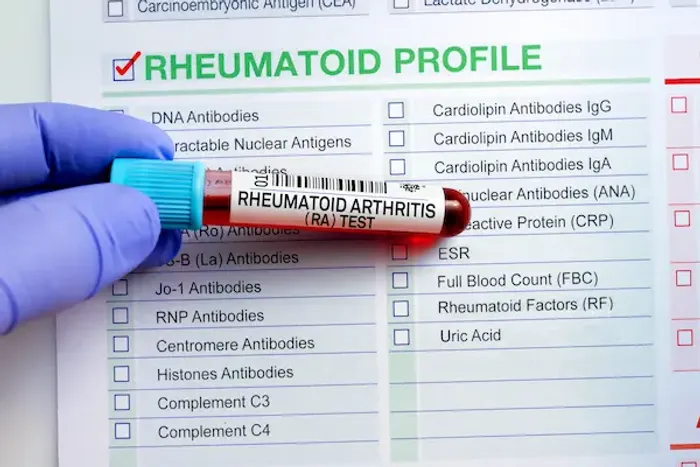Rheumatoid Factor Tests for Arthritis Diagnosis
Understand the role of Rheumatoid Factor (RF) tests in diagnosing arthritis, including how the test works, what results mean, and its significance in identifying autoimmune conditions.


Arthritis is a common condition that affects millions of people worldwide, causing joint pain, stiffness, and swelling. One of the key tests doctors use to diagnose certain types of arthritis, especially rheumatoid arthritis (RA), is the Rheumatoid Factor (RF) test. If you or a loved one is experiencing joint discomfort, understanding this test can help you take the right steps toward diagnosis and treatment.
What is a Rheumatoid Factor (RF) Test?
The Rheumatoid Factor (RF) test is a blood test that checks for the presence of RF antibodies in your blood. These antibodies are proteins produced by your immune system that mistakenly attack healthy tissues, particularly the joints. While RF is commonly associated with rheumatoid arthritis, it can also be found in other autoimmune conditions and even in some healthy individuals.
Why is the RF Test Done?
Doctors recommend an RF test when someone shows symptoms of rheumatoid arthritis (RA) or other autoimmune disorders. The test helps in:
- Diagnosing RA: High levels of RF may indicate rheumatoid arthritis.
- Differentiating RA from other types of arthritis: Not all joint pain is due to RA, so this test helps confirm the diagnosis.
- Monitoring disease progression: If you already have RA, your doctor may use RF levels to track how the disease is
progressing.
Symptoms That May Lead to an RF Test
If you experience any of the following symptoms, your doctor might suggest an RF test:
- Joint pain, stiffness, or swelling (especially in small joints like fingers and wrists).
- Morning stiffness lasting more than 30 minutes.
- Fatigue and weakness without a clear cause.
- Numbness or tingling in hands or feet.
- Fever or weight loss without explanation.
How is the RF Test Performed?
The RF test is a simple blood test where a small sample of your blood is taken from a vein in your arm. The process is
quick and similar to other routine blood tests. No special preparation is needed, but always inform your doctor about any medications you’re taking, as some drugs can affect the results.
Understanding Your RF Test Results
- Normal Range: Typically, an RF level below 14 IU/mL is considered normal.
- Positive RF Test: A higher level may suggest RA or another autoimmune disease, but it doesn’t always mean you have
RA. - Negative RF Test: A negative result doesn’t completely rule out RA, as some people with RA don’t have RF in their
blood (seronegative RA).
What If My RF Test is Positive?
A positive RF test alone doesn’t confirm RA. Your doctor will consider:
- Your symptoms (joint pain, swelling, stiffness).
- Other blood tests (like anti-CCP test, ESR, CRP).
- Imaging tests (X-rays, ultrasounds, or MRI scans).
Consult Top Specialists
Conditions Linked to High RF Levels
While RA is the most common cause of high RF, other conditions can also lead to elevated levels, such as:
- Other autoimmune diseases (lupus, Sjögren’s syndrome).
- Chronic infections (hepatitis, tuberculosis).
- Liver or lung diseases.
- Certain cancers.
Managing Rheumatoid Arthritis (RA)
If you’re diagnosed with RA, early treatment can help slow joint damage and improve quality of life. Here are some
ways to manage RA:
1. Medications
- Disease-modifying antirheumatic drugs (DMARDs): Slow disease progression.
- Biologics: Target specific parts of the immune system.
- Pain relievers & anti-inflammatory drugs: Reduce pain and swelling.
2. Lifestyle Changes
- Exercise regularly: Low-impact activities like swimming, walking, or yoga help maintain joint flexibility.
- Eat a balanced diet: Anti-inflammatory foods (fish, nuts, fruits, vegetables) can help.
- Maintain a healthy weight: Reduces stress on joints.
- Get enough rest: Fatigue worsens RA symptoms.
3. Physical Therapy
A physiotherapist can teach exercises to strengthen muscles and improve joint function.
4. Stress Management
Stress can trigger flare-ups, so relaxation techniques like meditation can be beneficial.
When to See a Doctor?
If you have persistent joint pain, stiffness, or swelling, consult a rheumatologist (a specialist in arthritis and autoimmune
diseases). Early diagnosis and treatment can prevent long-term joint damage.
Book a Consultation or Test with Apollo 24|7
If you suspect arthritis symptoms, don’t delay getting checked. You can easily book a Rheumatoid Factor test or consult a rheumatologist through Apollo 24|7. Early detection leads to better management of arthritis and improved quality of life.
Conclusion
The Rheumatoid Factor test is an important tool in diagnosing RA and other autoimmune conditions. While a positive
result doesn’t always mean you have RA, it helps doctors make an informed diagnosis when combined with symptoms and other tests. If you’re experiencing joint pain or stiffness, don’t ignore it—seek medical advice early. With the right treatment and lifestyle changes, you can manage RA effectively and lead an active, fulfilling life.
Consult Top Specialists
Consult Top Specialists

Dr. Arupratan Ghosh
General Physician/ Internal Medicine Specialist
24 Years • MBBS, DPH, MD Physical Medicine & Rehabilitation
Kolkata
SATKRIT HEALTHCARE - A MULTISPECIALITY CLINIC, Kolkata
Dr. Bharat K Singh
Rheumatologist
12 Years • MBBS, MD, DM
Jaipur
C K Birla Hospital, Jaipur

Dr. Anand Ravi
General Physician
2 Years • MBBS
Bengaluru
PRESTIGE SHANTHINIKETAN - SOCIETY CLINIC, Bengaluru
Dr Ankit Patowari
Rheumatologist
6 Years • MBBS, MD MEDICINE, DM RHEUMATOLOGY
Guwahati
Apollo Clinic Guwahati, Assam, Guwahati

Dr. Zulkarnain
General Physician
2 Years • MBBS, PGDM, FFM
Bengaluru
PRESTIGE SHANTHINIKETAN - SOCIETY CLINIC, Bengaluru
Consult Top Specialists

Dr. Arupratan Ghosh
General Physician/ Internal Medicine Specialist
24 Years • MBBS, DPH, MD Physical Medicine & Rehabilitation
Kolkata
SATKRIT HEALTHCARE - A MULTISPECIALITY CLINIC, Kolkata
Dr. Bharat K Singh
Rheumatologist
12 Years • MBBS, MD, DM
Jaipur
C K Birla Hospital, Jaipur

Dr. Anand Ravi
General Physician
2 Years • MBBS
Bengaluru
PRESTIGE SHANTHINIKETAN - SOCIETY CLINIC, Bengaluru
Dr Ankit Patowari
Rheumatologist
6 Years • MBBS, MD MEDICINE, DM RHEUMATOLOGY
Guwahati
Apollo Clinic Guwahati, Assam, Guwahati

Dr. Zulkarnain
General Physician
2 Years • MBBS, PGDM, FFM
Bengaluru
PRESTIGE SHANTHINIKETAN - SOCIETY CLINIC, Bengaluru